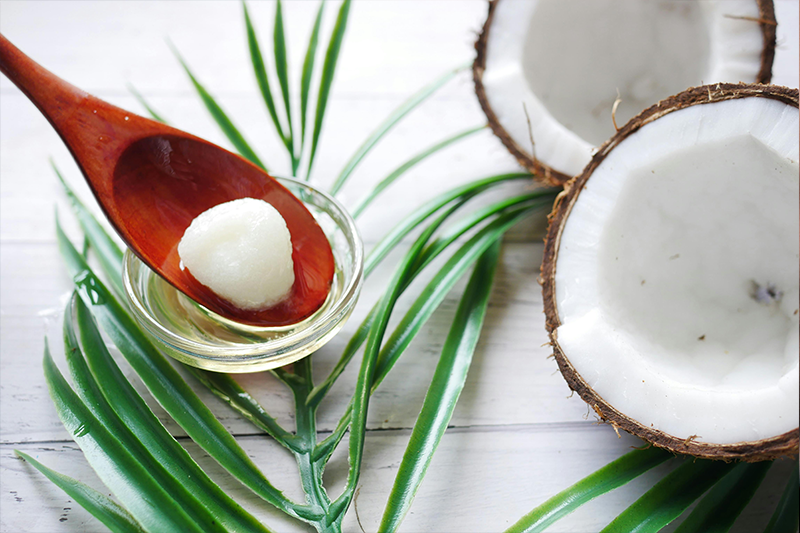10 Nourishing Ways to Use Coconut Oil for Healing
At Together Against Cancer, we believe healing extends far beyond medical treatment – it’s also about finding ways to take care of your whole self in the best possible way. Nature can provide us with so many gifts when we are curious enough to explore further, and one of the most versatile is coconut oil. Rich in natural fats and antioxidants, it’s a simple yet powerful way to care for yourself from the inside out.
Here are ten great ways to use organic raw coconut oil for healing and to support your wellbeing:
1. Energy for Recovery
During or after cancer treatment, your body is working incredibly hard even when you’re resting. Healing, rebuilding tissues, processing medications and managing inflammation all require extra energy. Treatments like chemotherapy, radiotherapy or surgery can also place additional demands on the body. It’s natural to feel more tired than usual – your body is using much of its energy for recovery.
Coconut oil contains medium-chain triglycerides (MCTs), which are easily digested and converted into fuel by the liver. Unlike heavier fats, they don’t rely on complex digestive processes, making them a soothing source of vitality when your system feels depleted. Adding a small spoonful of coconut oil to warm porridge or smoothies can support the body to rebuild.
2. Cooking with Care
Coconut oil is a wonderful alternative to butter or vegetable oils. Its MCTs are naturally easy to digest and healthy fats can support gut health, soothe the digestive tract and even encourage better nutrient uptake without placing extra strain on the stomach or liver. Try using it in soups and curries, or stir a small amount into warm drinks or porridge to nourish your gut and support the body.
3. Stretch Mark & Scar Care
Our skin is exposed to a lot in our lifetimes, even more so when the body is under strain. Scientific studies have shown that coconut oil can improve skin hydration and elasticity, while also helping to reduce water loss from the skin’s surface. This makes it especially useful for dryness or sensitivity caused by treatment. When applied in small amounts, it melts into the skin, delivering essential fatty acids that nourish at a cellular level without clogging pores.
Note: As everyone’s skin reacts differently, it’s best to do a small patch test first or consult your healthcare team if you’re unsure.
4. Natural Skin Relief
Coconut oil’s natural composition includes medium-chain fatty acids, particularly lauric acid, which has well-documented antibacterial, anti-fungal and anti-inflammatory properties. These compounds help to calm irritation and support the skin’s natural barrier – the protective layer that keeps moisture in and environmental irritants out.
For those prone to breakouts or inflammation, coconut oil may also help by gently balancing the skin’s natural microbiome, the delicate ecosystem of beneficial bacteria that keeps the skin calm and resilient. It can also be used as an after shave skin soother for the face, legs and underarms. Applied lightly, it helps balance and hydrate.
5. Oral Health & Detox Support
Oil pulling, an ancient Ayurvedic practice, involves gently swishing coconut oil in the mouth to help draw out impurities and support a clean oral environment. Research has shown that oil pulling with coconut oil can help reduce harmful bacteria, freshen breath and support gum health – all without harsh chemicals. This is great if your mouth feels sensitive after treatment or if you wish to avoid strong-tasting toothpastes and mouthwashes.
To try it, place about a teaspoon of organic raw coconut oil in your mouth and swish it gently for 5–10 minutes (even a few minutes helps). Then spit it out (never swallow) and rinse with warm water.
6. Natural Sinus Soother & Essential Oil Carrier
When you’re feeling congested or run down, coconut oil can be used as a gentle base for natural vapour balms. Blended with a drop of essential oil (like eucalyptus or peppermint, if tolerated), it can be massaged lightly onto the chest to support easier breathing and comfort.
In fact, coconut oil makes a great carrier and grounding base for aromatherapy blends such as lemon, lavender or bergamot, that can ease anxiety, promote rest and uplift the spirit.
7. Hair & Scalp Rejuvenation
Hair loss, dryness or scalp sensitivity are common side effects of treatment. Massaging a small amount of coconut oil into the scalp can soothe irritation and nourish new growth. It can also help smooth and condition the hair, leaving it soft and manageable.
9. Exfoliating Body Scrub
Coconut oil makes the perfect base for a natural exfoliating scrub. Its rich, creamy texture deeply hydrates while protecting the skin’s moisture barrier, helping to prevent the dryness or tightness that can sometimes follow conventional scrubs. Combined with a natural exfoliant like sea salt, brown sugar or finely ground oats, it creates a soothing blend that smooths and nourishes at the same time.
10. Natural Make-up Remover
Finally, turn to coconut oil for a chemical-free alternative to make-up remover. It can melt away make-up with ease, even waterproof mascara, while softening the skin and nourishing lashes. It’s a natural, supportive way to cleanse and care at the same time.
Always choose organic raw coconut oil for the purest benefits and make sure to listen to your body as you explore new ways to nurture it. Whether you choose to use coconut oil in your meals, your skincare, or simply in a moment of mindfulness, coconut oil for a healing is a wonderful and effective element to add to your natural wellbeing medicine kit!
At Together Against Cancer, we often welcome guest speakers to the Wellness Centre to support your health and wellbeing, including holistic and science-backed guidance on a cancer journey. If you have any queries about using coconut oil or anything mentioned in this post, please reach out to our team or keep an eye on our events page for an updated schedule of workshops over the coming months: https://www.togetheragainstcancer.org.uk/events/


